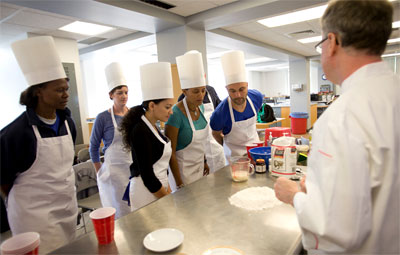Six-member crew selected for Mars food mission

HONOLULU -- After receiving more than 700 applications, researchers at the University of Hawaii at Mānoa and Cornell have selected six individuals -- including an alumnus who lives in Ithaca -- to make up the crew of a four-month simulated Mars mission intended to test new forms of food and food preparation strategies for deep-space travel.
The mission, dubbed HI-SEAS (Hawaii Space Exploration Analog and Simulation), is part of a study for NASA to determine the best way to keep astronauts well nourished during multiple-year missions to Mars or the moon.
The six-member prime crew was chosen from a group of nine that participated in an intense first phase of testing and training held in mid-June. The three remaining individuals will make up the reserve crew.
Along with two days of cooking lessons at Cornell's test kitchens, the volunteers took part in team-building exercises, sensory testing and academic preparation for a trip in early 2013 to live in isolation on a barren lava field in Hawaii.
The research team includes three Cornell scientists: Jean Hunter, associate professor of biological and environmental engineering; Bruce Halpern, professor of psychology and of neurobiology and behavior; and postdoctoral associate Bryan Caldwell. The team was also joined by Rupert Spies, chef and senior lecturer at Cornell's School of Hotel Administration. Spies led the hands-on kitchen training sessions and will assist in the development of a custom menu for the study.
According to Hunter, one of the biggest food challenges astronauts face is menu fatigue. Over time, they not only tire of eating foods they normally enjoy, but also tend to eat less, which can put them at risk for nutritional deficiency, loss of bone and muscle mass, and reduced physical capabilities. The HI-SEAS mission will test whether crew nutrition, food intake and food satisfaction can be improved if crews cook for themselves, and will assess the additional resource cost of a crew-cooked food system.
The research team will compare the palatability of available instant foods and food prepared by the crew, and determine whether food preferences change over time. They will also compare the time, power and water required for meal preparation and cleanup for instant and crew-cooked foods, and compile recipes and cooking tips.
Those selected for the prime crew are:
The reserve crew members are:
The crew will participate in a two-week training session in late 2012 prior to the four-month simulation mission in early 2013. In Hawaii, the volunteers will be required to live and work like astronauts, including suiting up in space gear whenever they venture out of a specially built simulated Martian base.
Each crew member also has a personal project in research or outreach that they will be working on during the mission, in addition to their role in the food study.
Media Contact
Get Cornell news delivered right to your inbox.
Subscribe